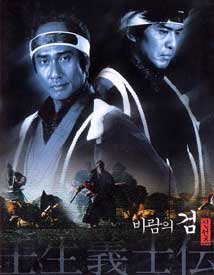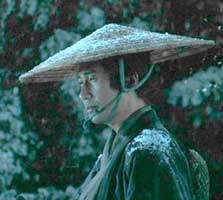 One of the most often filmed samurai film themes regards Shinsengumi, the anti-royalist "wolves of Mibu" (a district in Kyoto) who, as the Tokugawa Era was coming to a close in the late 1800s, struggled to keep the shogunate in power. One of the most often filmed samurai film themes regards Shinsengumi, the anti-royalist "wolves of Mibu" (a district in Kyoto) who, as the Tokugawa Era was coming to a close in the late 1800s, struggled to keep the shogunate in power.
Shinsengumi was made up of formerly masterless samurai & farmers who became samurai, who should've known better than to stand in the way of progress, but who were uncommonly devoted to the Tokugawa regime & became especially proud to have been made "personal vassals to the shogun" meaning they were hatamoto or samurai bannermen.
Even after the Tokugawa regime had fallen & the Meiji Restoration was beginning, the last members of Shinsengumi continued fighting against imperial troops in favor of the no longer relevant shogunate.
Partly because the Japanese tend to have a soft heart when it comes to die-hard losers under the heading of "the nobility of failure," & also because Japan never makes any changes without regret & sentimental feelings for what was left behind, Shinsengumi has become the subject of romantic fiction & romanticized historical texts, interwoven with masculine identity.
Still, the Wolves of Mibu are not treated as pure heros as are the "brave 47 ronin" of the "Chushingura" cycle, as some believe Shinsengumi was a gang of semi-psychotic rabble. The majority would accept that some of the members were great men but misguided, but among their numbers some were unnecessarily brutal. The extremes of opinion leave room for considerable interpretation & credible revisionism.
As heroic figures go, even in their nearly idealized forms they are just about as imperfect as heroes come. Calculating henchman Hijikata & tubercular Okita are often depicted as killing veritably for pleasure, whereas their leader, Kondo, had a tendency to goodheartedness undermined by his ex-farmer's rigidity to the samurai ethos which permitted cruelty even against his own men. Hijikata was homosexual & many believe that "comrade love" was especially prevalant through the whole group, a probability highlighted in Nagisa Oshima's superb Shinsengumi film Taboo (Gohatto, 1999).
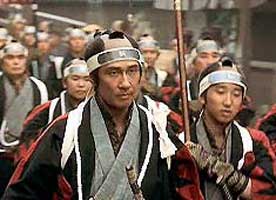 There are several things that set the multiple award-winning When the Last Sword is Drawn (Mibu gishi den, Shochiku, 2002) apart from all other Shinsengumi films. Foremost, it is not a film about Kondo, Hijikata, Okita, Serizawa, or the other best-known illuminaries of the organization, as encountered in such films as Kenji Misumi's Shinsengumi Chronicles: I Want to Die a Samurai. (Shinsengumi shimatsuki, 1963) or Tadashi Sawashima Band of Assassins (Shinsengumi, 1969) or any number of otehr versions. There are several things that set the multiple award-winning When the Last Sword is Drawn (Mibu gishi den, Shochiku, 2002) apart from all other Shinsengumi films. Foremost, it is not a film about Kondo, Hijikata, Okita, Serizawa, or the other best-known illuminaries of the organization, as encountered in such films as Kenji Misumi's Shinsengumi Chronicles: I Want to Die a Samurai. (Shinsengumi shimatsuki, 1963) or Tadashi Sawashima Band of Assassins (Shinsengumi, 1969) or any number of otehr versions.
Instead, two members of Shinsengumi have been selected as the central characters, men who existed historically but about whom extremely little is known, allowing for considerable if not complete invention. They were devised by lifelong Shinsengumi "fan" Asada Jiro in a two-volume epic novel that became a bestseller.
So while the familiar members of Shinsen group are seen in the background, they are all but irrelevant to the story told here. Plus, although there is no derth of action, the emotional condition, the dreams, even the disappointments of the central characters are the more important. There is a sense of the tragedy of manhood, & the better the man the less likely his survival. This goes well beyond the usual "serious" samurai films such as reflect an aesthetics of sadism & the sadness of existence. By the ending has frankly delved into the purely maudlin.
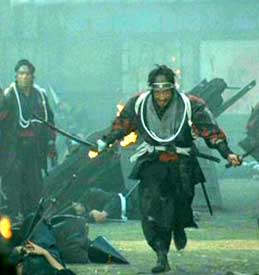 Kanichiro Yoshimura (Kiichi Nakai) is a low-ranking village samurai noted for his education & swordsmanship, but so low in his clan that he can barely make ends meet. During a time of famine, he can no longer feed himself, his wife Shizu (Yui Natsukawa), & two children, so that his wife considers suicide so that there will be one less mouth to feed through the winter; indeed, she is so desparate she wants them to eat her as meat once she is dead. Kanichiro weepily talks her out of this horrible plan & promises he will never permit her to become this desparate ever again. Kanichiro Yoshimura (Kiichi Nakai) is a low-ranking village samurai noted for his education & swordsmanship, but so low in his clan that he can barely make ends meet. During a time of famine, he can no longer feed himself, his wife Shizu (Yui Natsukawa), & two children, so that his wife considers suicide so that there will be one less mouth to feed through the winter; indeed, she is so desparate she wants them to eat her as meat once she is dead. Kanichiro weepily talks her out of this horrible plan & promises he will never permit her to become this desparate ever again.
Though it is considered traitorous & almost unthinkable to leave one's clan, Kanichiro knows he could make enough money to see to his family's well being if he went to work in Kyoto. After his wife's attempted suicide, he realizes he must put family even before his lord; he feels that he is a vassal to no one but his wife. This is a revolutionary thought in a world where vassals were supposed to be willing to kill their entire families if a lord required it. He bids his family the saddest of farewells & sets out to join the pro-shogunate Shinsengumi, himself living in Kyoto as minimally as possible in order to send his wages to his family.
Kiichi Nakai plays this character as utterly devoid of vanity, a decent man who has no need to shape others' perception of him. His fellow members of they group like him because he is a cheerful & warmhearted man, but his behavior also appears somewhat money-grubbing. The fact that he never seems to spend any money but is always pursuing more of it makes him appear to be a miser. He never attempts to explain himself, & the all but orgasmic joy he expresses whenever he can make a few extra coins renders him somewhat a laughingstock, even if a beloved one.
The "antagonist" Hajime Saito (Koichi Sato) was by my measure the actual protagonist of this film since he's the only one who learns, changes, grows. He is a "bad" man, at least at first, insofar as he kills without sorrow & though it is strictly forbidden under penalty of death, he will even kill fellow members of Shinsengumi so long as he can do so without getting caught. He is deeply cynical but even at his worst we see him nevertheless devoted to Nui (Miki Nakatani), the woman he has bought out of prostitution, & he obviouisly has a capacity for goodness even if his behavior is sometimes evil.
Hajima's first response to the bright-eyed & bushy-tailed Kanchiro is disgust, & he decides immediately to kill him for no reason other than he's annoyingly upbeat & absurdly boastful about his family & home province. But when he attacks Kanchiro, he discovers that they are evenly matched, & so withdraws pretending, "I'm not serious. I was merely testing you."
By observing the selfless behavior of Kanchiro, Hajima begins to admire him against his will, at first annoyed at himself for doing so. Hajima's philosophy is, "We're all sacks of shit," & nobody deserves to live, not himself, not the men he fights beside, not anyone he has ever killed. But by slow progression he sees more & more strengths in Kanchiro, the final admirable trait being his deep capacity for devotion to duty. Indeed, his devotion to Shinsengumi becomes just a tad crazed, as duty within the bushido code begins to outweigh even his previous claim that his true vassalage is to his wife. Hajima admires this "true samurai" nature that is in Kanchiro but which at the end of the Tokugawa Era is increasingly rare.
I as viewer felt Kanchiro should have remained true to his sentiment that his real duty was to his wife, & he should never have thrown his life away on a useless cause. As a man who "lives by my conscience" he was able to turn his back on vassalage to his clan in order to place his wife & family foremost, though it meant being parted from them to work in a distant place. But within Shinsengumi, he cannot imagine being undutiful a second time in his life, & commits himself with wholehearted abandon.
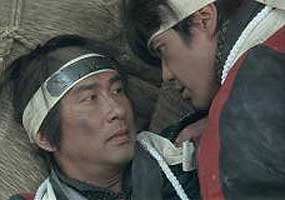 When it comes to Shinsengumi's last stand, by this time one could almost presume Hajima is in love with Kanchiro (& one of their early scenes together, sharing the same umbrella in the rain, is in fact a symbol of lovers). The few who have not run off from Shinsengumi after the fall of the shogunate are about to make their final useless stand against royalist forces, & when starving Hajima realizes the rice-ball he has reluctantly accepted from Kanchiro was Kanchiro's last & only chance of a meal, he angrily alleges hatred for a man who would do so much good for others (acts which incur debts of gratitude Hajima like most men would prefer to avoid). He leaps upon Kanchiro to attack him, but ends up laying atop him in an awfully friendly manner, tearfully begging Kanchiro to flee from this last battle. Since all men on earth except Kanchiro are sacks of shit, Hajima half in hysterics admits "I don't want you to die!" When it comes to Shinsengumi's last stand, by this time one could almost presume Hajima is in love with Kanchiro (& one of their early scenes together, sharing the same umbrella in the rain, is in fact a symbol of lovers). The few who have not run off from Shinsengumi after the fall of the shogunate are about to make their final useless stand against royalist forces, & when starving Hajima realizes the rice-ball he has reluctantly accepted from Kanchiro was Kanchiro's last & only chance of a meal, he angrily alleges hatred for a man who would do so much good for others (acts which incur debts of gratitude Hajima like most men would prefer to avoid). He leaps upon Kanchiro to attack him, but ends up laying atop him in an awfully friendly manner, tearfully begging Kanchiro to flee from this last battle. Since all men on earth except Kanchiro are sacks of shit, Hajima half in hysterics admits "I don't want you to die!"
As point of fact there is no reason for this final battle except to die like a samurai even for a cause already definitively lost. Kanchiro, as his wife's vassal, should've been the last one to refuse to give up when ordered to retreat. Instead, when Shinsengumi's captain orders for no one to attack the Emperor's flag, only Kanchiro, following that sometimes misguided conscience of his, draws both his swords, cries out an apologetic challenge, & runs into a barrage of gunfire, vanishing in smoke, wounded Hajima willing but unable to go with him & still screaming "Yoshimura! Don't die!"
The film should have ended about here, with at most ten minutes of epilog if it were stretched out. Up to now it has been an amazing, old-fashioned, ultra-heroic, ultra-cool action-packed samurai film with the deepest of characterization. Alas, it continues another half hour of epilog atop coda atop epilog.
Hajima in his old age has brought his grandson to a doctor's residence in the middle of the night, & seeing a photo of Kanchiro on the doctor's desk, has been sitting in the outer office talking to the husband-doctor & waiting for the wife-doctor to finish with his grandson. The photo causes him to ponder his own youthful history with the man in that photo, whose daughter we suspect at once, rightly it turns out, is the doctor with the kid. The doctor-husband Chiaki (Takehiro Murata) was Kanchiro's son's best friend in childhood & youth, & he was by chance witness to Kanchiro's last hours of life. Sharing sake in small cups, Chiiaki reveals the final chapter of Kanchiro's life.
Chiaki's father had been sent to Osaka to see to the political safety of the rural clan during those times of upheaval & change. Osaka was where Shinsengumi took its last stand. After Kanchiro ran into the hail of bullets he was certainly wounded but not mortally & has every chance of recovery. This survival is totally unbelievable & only the first reason the film falls to pieces at this point.
He seeks refuge with his old clan at their Osaka residence, begging to be cared for until he recovers. The minister Jiroemon Ono (Yuji Miyake) who oversees the Osaka residence was Kanchiro's lifelong friend, who would give his life for Kanchiro, but could not risk the life of his entire clan, & so orders the rebel to commit suicide.
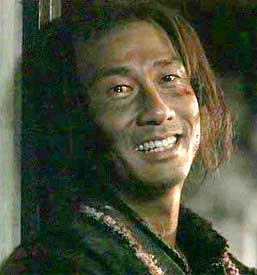 Much of what follows is of the "tortured puppy" cheap way to wring tears from people. Imagine if a puppy, run over on the side of the road, could say, "I wish I could see my best friend Little Timmy once more before I die" or "My only regret is I will never again gnaw my favorite bone." By now Kanchiro is nothing but a talking wounded puppy with one of the hammiest, longest-winded pre-death speeches ever perpetrated against a willing audience. Much of what follows is of the "tortured puppy" cheap way to wring tears from people. Imagine if a puppy, run over on the side of the road, could say, "I wish I could see my best friend Little Timmy once more before I die" or "My only regret is I will never again gnaw my favorite bone." By now Kanchiro is nothing but a talking wounded puppy with one of the hammiest, longest-winded pre-death speeches ever perpetrated against a willing audience.
The actor playing Kanchiro is so appealling & beautiful that it certainly does work as a tearjerker, but at the same time it is positively burlesque how exaggeratedly over-the-top this speech about missing his family & hoping his wife will forgive him for committing suicide & so on & so forth ad infinitum until it's a blessed relief when he finally shuts up & dies, although even then his best friend comes back in the room, hugs his pal's corpse, & weepingly tries to get him to eat a rice-ball from his old home town ("Little Timmy finds the dead dog"). An emotionally realistic film has turned totally into an tear-fest aimed at little girls who love horsies & sentimental old men who might wish their own money-grubbing wasted lives had somehow added up to a heroic adherence to duty for family & company mission.
This goshawful excess could be forgiven because it does permit the viewer to wallow in tears if so inclined. However, this lengthy sequence contains not one piece of information about Kanchiro's emotional state that we did not already know when he ran into that hail of bullets & which certainly should have been his last scene. The three-hanky-weeper tacked on to the end lacks all restraint & definitively is not art even though much that led up to it nearly was.
Adding insult to injury, there are several codas to this wounded-puppy epilog in which we're supposed to relate to numerous other characters' sadnesses & responses to the loss of Kanchiro, including his sixteen year old son's personal heroic sacrifice. The increasingly cheezy manipulations strive to wring far, far too much out of the tragedy, but instead makes the film in that last half hour an unintended jest.
The real climax of the film is when Hajima tries to convince Kanchiro to run away, being the only decent man on earth, & Kanchiro refusing to survive despite his promises to his family. We have at that moment best & final revelations about the character of both men. Everything after that sequence is redundant & detracts from the film. But get out plenty of hankies anyway, as between eye-rolling & guilty giggles you just may need more than three.
In the verisimilitude & sincerity of its tragedy, When the Last Sword is Drawn is not the equal of Twilight Samurai (2002) which never for a moment becomes mawkish in its treatment of the samurai as loving family man who for all his inconsequential rank cannot evade a warrior's duty. As a result Twilight Samurai is vastly more moving & unutterably beautiful.
But When the Last Sword is Drawn shares with Twilight Samurai a complete lack of today's ultramodern kitsch factor such afflicts the majority of newer samurai films. Yojiro Takita's epic is one of the tiny handful of films released in the last few years that are true throwbacks to an era when samurai movies were greatest.
copyright © by Paghat the Ratgirl
|
